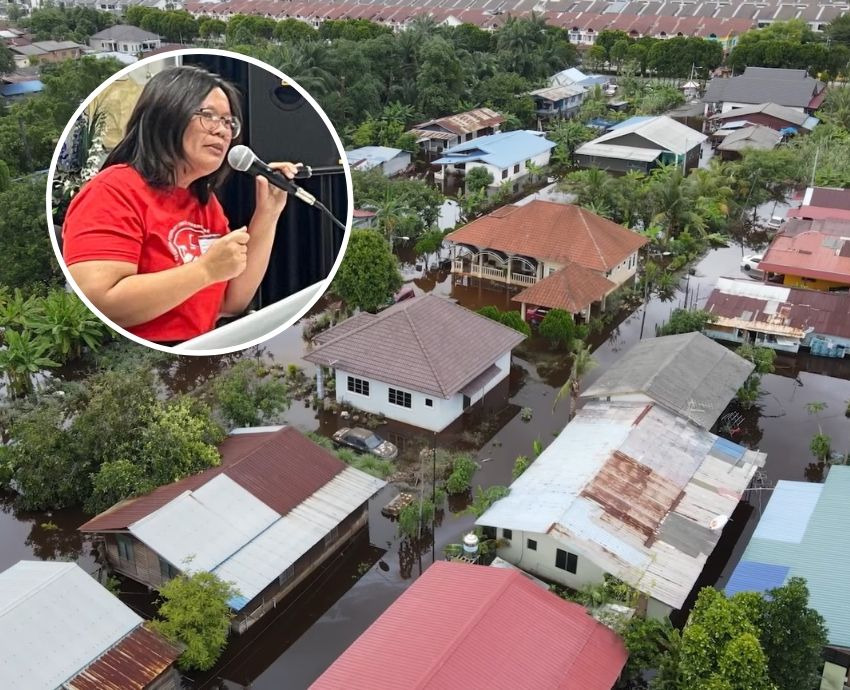
Malaysian Socialist Party (PSM) leader Soh Sook Hwa addressed the recent Socialist Alliance national conference in Geelong, saying that in Malaysia there is a growing population of young people concerned about environmental issues.
“Undoubtedly, the widespread ‘Greta Thunberg phenomenon’ has contributed to make global warming and other climate challenges the hot topics of our time. In Malaysia’s case, major floods brought on by environmental destruction have created consciousness over the overdevelopment that only benefits the wealthy ruling elites.”
The December 2021 flood was one of the worst in Malaysia’s history, killing 50 people and displacing 70,000. A tropical depression that made landfall on the eastern coast of Peninsular Malaysia brought heavy rains that lasted for several days.
PSM environmental campaigners Huei Ting and Audrey Chan wrote about the floods in Think Left: “The government was slow to deliver flood response, and a lack of clear central communication made things worse. Flood victims and volunteers [took] to social media to call for aid and coordination of flood relief efforts, showing solidarity among the people in the face of disasters.”
Sook Hwa said: “It made people realise that the climate crisis is no longer a looming threat, it is already happening in Malaysia.”
The Climate Emergency Coalition of Malaysia (Gabungan Darurat Iklim Malaysia, GDIMY) concluded that “lacklustre flood mitigation policies, loss of biodiversity and rainfall catchment areas, poor urban planning and unchecked development are all factors that culminated in this disaster”, Ting and Chan wrote.
“For 20 years, flood mitigation measures were sufficient to avoid major flooding — until the development of new projects in the surrounding areas compounded on the existing drainage system.”
A second devastating flood hit the village of Kampung Iboi, approximately 400km from the capital Kuala Lumpur, on July 4 last year. “That cost RM28 million in losses and four lives,” Sook Hwa said.
Since then, the villagers have faced at least 11 incidents of severe flooding, she said. “A massive volume of sand was brought down by the flood … houses were still covered in mud … [and] the mountainside was bare and covered by rock fall and large boulders.”
The floods also exposed the scale of uncontrolled logging and mining activities in the country.
“State governments who have sole authority over forests are often embroiled in a situation where they will award forest logging licences or convert forest lands into crop plantations to generate state revenue or use it to gain political leverage — often with the involvement of Malaysia’s royal families,” wrote Ting and Chan.
“In early June 2021, the Pahang state government approved an iron ore excavation project by a royalty-linked mining company near Tasik Chini, a UNESCO biosphere reserve.
“The forest reserve has a history of pollution due to mining and logging activities since 2005. Orang Asli [Indigenous] communities in the area have been concerned about their wells being contaminated due to their reliance on rain and swamp water for consumption and daily activities.
“Fortunately, the project had been cancelled later in the month due to public outrage. Yet, later in the same month, there were still iron ore mining proposals at a degazetted forest reserve in Kuala Mukim Tembeling, Pahang, which is listed as an Environmentally Sensitive Area.
“The flood not only laid bare the devastating effects of capitalism that thrives on the relentless pursuit of profits over sustainable development, it also managed to flush out the dirty laundry of our ruling elites.”
Sook Hwa said that “besides advocating for more [flood and climate change] mitigation policies, we see a need to advocate for ecosocialism”.
PSM has been working with a range of civil society groups in the GDIMY, “to push forward flood mitigation policies and transparent governance”. PSM has also launched some initiatives “to organise the affected community directly”, she said.
“We established a good working relationship with civil society and affected communities, at the same time, advocating for ecosocialism as a solution to put people and ecology before profit.
“Besides a reform agenda I think we need a real change — systematic change — in our development, because ... the previous government, the state governments — both liberal and conservative — were giving too much to developers, where this is not sustainable.”
Ting and Chan advocate that Malaysians should echo “the solidarity spirit of #KitaJagaKita (We Take Care of Us)”, as happened during the floods, to “mobilise for concrete changes in the country’s political landscape” and to “continue showing solidarity across different races, religions and nationalities for a better world”.